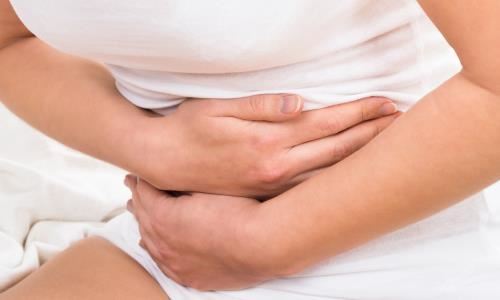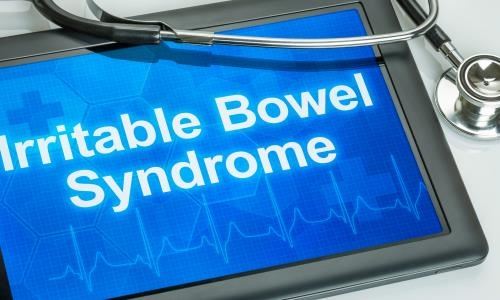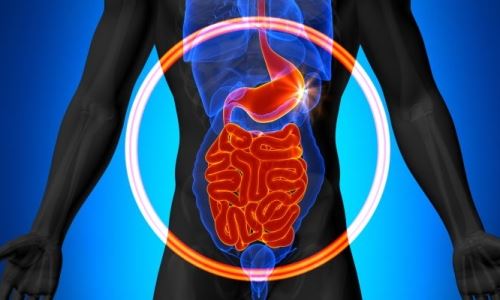Treatment of Irritable bowel syndrome
Research shows that patients often seek advice on dietary intervention in order to help their IBS symptoms [1]. Understandably patients want to know which foods to avoid and which are safe to eat.
For many patients it is important that simple healthy eating guidance is given as this may be sufficient to reduce symptoms considerably.
Over the last few years considerable research has been focused on looking for more specific and effective dietary solutions for IBS, in particular the Low FODMAP Diet and the gluten free diet. Indeed, the Low FODMAP Diet is now noted on the UK NICE Guidance [2] and in the British Dietetic Association IBS Guidance [3].
There have been three randomized controlled trials published showing a clear benefit of using the Low FODMAP diet [4,6,7] and this data, along with three prospective uncontrolled trials [8-10] and two further retrospective trials [11,12], has led to fermentable carbohydrate restriction becoming an important consideration IBS treatment. Research indicates that patients using this diet report a marked improvement in symptoms, with up to 70% of patients reporting benefit [13].
Over the last few years considerable research has been focused on looking for more specific and effective dietary solutions for IBS, in particular the Low FODMAP Diet and the gluten free diet. Indeed, the Low FODMAP Diet is now noted on the UK NICE Guidance [2] and in the British Dietetic Association IBS Guidance [3].
The low FODMAP diet
The Low fermentable oligosaccharides, disaccharides, monosaccharides, and polyols (FODMAP) diet was developed by a team from Monash University in Melbourne, Australia. The mechanisms by which these fermentable carbohydrates provoke gut symptoms are due to two underlying physiological processes: firstly, they are indigestible and subsequently fermented by the bacteria in the colon, which leads to gas production. The resulting gas can alter the gut environment and cause hypersensitivity in those who are susceptible to gut pain [4]. Secondly, there is an osmotic effect whereby fermentable carbohydrates increase water delivery to the colon leading to altered bowel habit [5].There have been three randomized controlled trials published showing a clear benefit of using the Low FODMAP diet [4,6,7] and this data, along with three prospective uncontrolled trials [8-10] and two further retrospective trials [11,12], has led to fermentable carbohydrate restriction becoming an important consideration IBS treatment. Research indicates that patients using this diet report a marked improvement in symptoms, with up to 70% of patients reporting benefit [13].
Where are FODMAPs found?
FODMAPs appear in a range of foods including wheat, certain fruit and vegetables and some milk-based products. In Western Europe, oligo-saccharides such as ‘fructans’ and the mono-saccharide, ‘fructose’, are the most common FODMAPs in the diet, with wheat thought to be the largest contributor of fructans in the UK [14].
Where are FODMAPs found [15]?
| Fermentable carbohydrate | Type | Relevant foods |
|---|---|---|
| Oligosaccharides | Fructans, galacto-oligosaccharides | Wheat, barley, rye, onion, leek, white part of spring onion, garlic, shallots, artichokes, beetroot, fennel, peas, chicory, pistachio, cashews, legumes, lentils and chickpeas |
| Disaccharides | Lactose | Milk, custard, ice cream and yogurt |
| Monosaccharides | Free fructose (fructose in excess of glucose) | Apples, pears, mangoes, cherries, watermelon, asparagus, sugar snap peas, honey, high-fructose corn syrup |
| Polyols | Sorbitol, mannitol, maltitol, xylitol | Apples, pears, apricots, cherries, nectarines, peaches, plums, watermelon, mushrooms, cauliflower, sugar free chewing gum/mints/sweets |
The low FODMAP approach: Important considerations
Despite the benefits, research suggests that this diet can have a detrimental effect on the gut bacteria [7] and may lack in calcium, and hence this diet is only to be used for 8 weeks at which point all removed foods must be reintroduced to tolerance in a stepwise manner. So far research shows this diet to be very successful when counselling is provided by a trained dietitian [16,17]. Patients should be discouraged from attempting to follow a low FODMAP diet without appropriate support and information.
A gluten-free diet for IBS
Research suggests that some patients with IBS (where coeliac disease has been excluded) find symptom relief when following a gluten free diet [18-21]. The reasons behind this observation are hotly debated amongst experts in the field and may be related to the presence of non-coeliac gluten sensitivity amongst a sub-group of IBS patients. It is also plausible that symptom improvement upon commencement of a gluten free diet is simply related to the concurrent reduction in the FODMAP content of the diet, namely a reduction in fructans found in wheat, barley and rye [22]. When considering the use of a gluten free diet for the management of IBS it is vital to ensure coeliac disease has been excluded prior to the removal of wheat/ gluten from the diet.
Probiotics
Research showing the benefits of probiotics in the treatment of IBS is conflicting and may be hampered by the fact that the human gut can be populated by any of 1000-1150 different bacterial species [23], and yet most probiotic supplements contain no more than a handful of species. Nevertheless, some probiotics have shown benefit and current NICE guidance [2] recommends that patients with IBS who choose to try probiotics should be advised to consume them for at least 4 weeks whilst monitoring the effect on symptoms.
Pharmacological and alternative therapies
Pharmacological treatment options for the management of IBS should be based on symptom nature and severity, these may include antispasmodics, laxatives, anti-diarrhoeal agents, tri-clyclic antidepressants and selective serotonin reuptake inhibitors. Side effects from pharmacological therapies are common and symptom relief may be variable. Patients who do not respond to dietary or drug management of their symptoms may benefit from psychological interventions including hypnotherapy [2].
References
- Halpert A, Dalton CB, Palsson O, Morris C, Hu Y, Bangdiwala S, et al. What patients know about irritable bowel syndrome (IBS) and what they would like to know. National Survey on Patient Educational Needs in IBS and development and validation of the Patient Educational Needs Questionnaire (PEQ). Am J Gastroenterol. 2007;102(9):1972-82.
- National Institute for Health and Care Excellence. Irritable bowel syndrome in adults: diagnosis and management of irritable bowel syndrome in primary care. London: NICE; 2015.
- McKenzie YA, Alder A, Anderson W, Wills A, Goddard L, Gulia P, et al. British Dietetic Association evidence-based guidelines for the dietary management of irritable bowel syndrome in adults. J Hum Nutr Diet. 2012;25(3):260-74
- Ong DK MS, Barrett JS, Shepherd SJ, Irving PM, Biesiekierski JR, Smith S, Gibson PR, Muir JG,. Manipulation of dietary short chain carbohydrates alters the pattern of gas production and genesis of symptoms in irritable bowel syndrome. Journal of gastroenterology and hepatology. 2010;25(8):1366-73
- Murray K, Wilkinson-Smith V, Hoad C, Costigan C, Cox E, Lam C, et al. Differential effects of FODMAPs (fermentable oligo-, di-, mono-saccharides and polyols) on small and large intestinal contents in healthy subjects shown by MRI. Am J Gastroenterol. 2014;109(1):110-9.
- Halmos EP, Power VA, Shepherd SJ, Gibson PR, Muir JG. A diet low in FODMAPs reduces symptoms of irritable bowel syndrome. Gastroenterology. 2014;146(1):67-75 e5.
- Staudacher HM, Lomer MC, Anderson JL, Barrett JS, Muir JG, Irving PM, et al. Fermentable carbohydrate restriction reduces luminal bifidobacteria and gastrointestinal symptoms in patients with irritable bowel syndrome. The Journal of nutrition. 2012;142(8):1510-8.
- de Roest RH, Dobbs BR, Chapman BA, Batman B, O'Brien LA, Leeper JA, et al. The low FODMAP diet improves gastrointestinal symptoms in patients with irritable bowel syndrome: a prospective study. Int J Clin Pract. 2013;67(9):895-903
- Mazzawi T, Hausken T, Gundersend D, El-Salhy M. Effects of dietary guidance on the symptoms, quality of life and habitual dietary intake of patients with irritiable bowel syndrome. Mol Med Rep. 2013;8:845-52.
- Wilder-Smith C, Materna A, Wermelinger C, Schuler J. Fructose and lactose intolerance and malabsoprtion testing: the relationship with symptoms in functional gastrointestinal disorders. Aliment Pharmacol Ther. 2013;37:1074-83.
- Gearry R, Irving PM, Barrett JS, Nathan DM, Shepherd SJ, Gibson PR. Reduction of dietary poorly absorbed short-chain carbohydrates (FODMAPs) improves abdominal symptoms in patients with inflammatory bowel disease - a pilot study. Journal of Crohns and Colitis. 2009;3(1):8-14
- Ostgaard H, Hausken T, Gundersend D, El-Salhy M. Diet and effects of diet management on quality of life and symptoms in patients with irritable bowel syndrome. Mol Med Rep. 2012;5:1382-90.
- Staudacher HM, Irving PM, Lomer MC, Whelan K. Mechanisms and efficacy of dietary FODMAP restriction in IBS. Nat Rev Gastroenterol Hepatol. 2014.
- Gibson PR, Shepherd SJ. Evidence-based dietary management of functional gastrointestinal symptoms: The FODMAP approach. Journal of gastroenterology and hepatology. 2010;25(2):252-8.
- Shepherd SJ, Lomer MCE, Gibson PR, Rome Foundation Working Group: Short-chain carbohydrates and functional gastrointestinal disorders; Am J Gastroenterol; 2013, 108: 707-717
- Staudacher HM, Whelan K, Irving PM, Lomer MC. Comparison of symptom response following advice for a diet low in fermentable carbohydrates (FODMAPs) versus standard dietary advice in patients with irritable bowel syndrome. J Hum Nutr Diet. 2011;24(5):487-95.
- Gibson PR, Barrett JS, Muir JG. Functional bowel symptoms and diet. Intern Med J. 2013;43(10):1067-74.
- Biesiekierski JR, Newnham ED, Irving PM, Barrett JS, Haines M, Doecke JD, et al. Gluten causes gastrointestinal symptoms in subjects without celiac disease: a double-blind randomized placebo-controlled trial. Am J Gastroenterol. 2011;106(3):508-14; quiz 15.
- Biesiekierski JR, Muir JG, Gibson PR. Is gluten a cause of gastrointestinal symptoms in people without celiac disease? Current allergy and asthma reports. 2013;13(6):631-8.
- Vazquez-Roque MI, Camilleri M, Smyrk T, Murray JA, Marietta E, O'Neill J, et al. A controlled trial of gluten-free diet in patients with irritable bowel syndrome-diarrhea: effects on bowel frequency and intestinal function. Gastroenterology. 2013;144(5):903-11 e3
- Shahbazkhani B, Sadeghi A, Malekzadeh R et al. Non-Celiac Gluten Sensitivity Has Narrowed the Spectrum of Irritable Bowel Syndrome: A Double-Blind Randomized Placebo-Controlled Trial. Nutrients. 2015 7(6): 4542-4554.
- Biesiekierski JR, Peters SL, Newnham ED. No effects of gluten in patients with self-reported non-celiac gluten sensitivity after dietary reduction of fermentable, poorly absorbed, short-chain carbohydrates. Gastroenterology 2013. 145(2):320-8.
- Whelan K. Probiotics and prebiotics in the management of irritable bowel syndrome: a review of recent clinical trials and systematic reviews. Current opinion in clinical nutrition and metabolic care. 2011;14(6):581-7.
Further information on this topic
Studies
8
Show all

Follow-up of patients with functional bowel symptoms treated with a low FODMAP diet
This retrospective, cross-sectional study aimed to investigate patient-reported long-term effects of the LFD, long-term adherence and dietary impact on disease course in patients with IBS and patients with IBD and co-existing IBS treated with the LFD.
>>Read more<<
>>Read more<<

Randomised clinical trial: the efficacy of gut-directed hypnotherapy is similar to that of the low FODMAP diet for the treatment of irritable bowel syndrome
The aims of the study where to perform a randomised clinical trial in patients with IBS, naïve to dietary or psychological therapies, to compare the effect of gut-directed hypnotherapy with the low FODMAP diet, alone or in combination on symptoms and psychological health over both a short (6 week) and long term (6 month) period.
>>Read more<<
>>Read more<<

Using best practice to create a pathway to improve management of irritable bowel syndrome: aiming for timely diagnosis, effective treatment and equitable care
This pilot project outlines the methods employed in one CCG to successfully develop a cost-effective IBS pathway with reduced secondary care involvement and improvement in patient care.
>>Read more<<
>>Read more<<

Efficacy of a gluten-free diet in subjects with IBS-D unaware of their HLA-DQ2/8 genotype
Aziz, A, Trott N, Briggs R, et al
Clin Gastroenterol Hepatol.
IBS-D accounts for almost one third of IBS patients and is the predominant subtype of IBS encountered in clinical practice. Research suggests that 84% of patients with IBS believe that food triggers their gastrointestinal symptoms and of these, gluten-based products are cited by approximately 1 in 4 patients as a common trigger. These observations have given rise to the clinical entity known as ‘non-coeliac gluten sensitivity’ (NCGS). However, NCGS remains a controversial condition due to the existence of co-existing non-gluten components (including FODMAPs) that have also been demonstrated to induce IBS symptoms. The purpose of this prospective study was to evaluate the clinical response to a gluten free diet (GFD) in a cohort of patients with IBS-D blinded to their HLA-DQ status. The long-term benefit and sustainability of a gluten free diet was also assessed. The study was conducted at the Royal Hallamshire Hospital in Sheffield between Sept 2012 and July 2015. Patients attending the gastroenterology out-patient clinic who fulfilled the Rome II criteria for IBS-D were eligible for inclusion. Coeliac disease was excluded based on negative serology and normal duodenal biopsy. Individuals with self-reported gluten sensitivity; those already on a GFD; and those with other medical conditions known to mimic IBS-D were also excluded. Seventy eight participants were selected as eligible to take part in the study, of these 48 patients agreed to enrol (24 HLA-DQ2/8+ve and 24 HLA- DQ2/8-ve). Subjects were referred to 1 of 2 senior dietitians who provided uniform information on how to undertake a GFD. Subjects were also given validated questionnaires to self-complete the day before commencing a GFD and during the GFD period, these included the IBS Symptom Severity Score (IBS-SSS), Hospital Anxiety and Depression Scale (HADS), Fatigue Impact Score (FIS), and Short-form 36 (SF-36) quality of life questionnaire. Seven subjects dropped out of the study (4 did not attend their initial dietitian appointment; 1 became pregnant; 1 started an additional diet; and 1 felt the GFD was too expensive). Those subjects remaining (21 HLA-DQ –ve; 20 HLA DQ +ve) were instructed to follow a GFD for 6 weeks, after which they returned for a follow-up appointment with the dietitians and returned their questionnaires. Dietary adherence was evaluated using a simple, validated tool. Patients were also asked if they intended to continue with a GFD for the foreseeable future. For those that answered yes, a follow-up dietitian appointment was arranged for approximately 18 months time. Importantly, both dietitians and patients were blinded to the fact that HLA-DQ2/8 status was being used as a comparative factor within the study. Following the 6-week GFD, a reduction of IBS-SSS of =50 points (indicating clinical benefit) was seen in 71% of patients, there was no difference between HLA-DQ groups. A significant symptom reduction was seen as early as week 2 and this continued to drop between each interval at week 4 and week 6. The greatest improvements were seen in those who had the severest IBS scores at baseline. In terms of IBS subscales, a significant mean reduction in abdominal pain, pain frequency, stool dissatisfaction and life interferences was observed in both HLA-DQ subgroups, with no difference between groups. However HLA-DQDQ2/8-ve subjects showed a greater reduction in abdominal distension compared with HLA-DQ2/8+ve subjects (p=0.04). A significant improvement in HADS, FIS and SF-36 quality of life was also observed following a GFD, seen across both groups. However HLA-DQ2/8+ve patients experienced a significantly greater improvement in depression (p=0.02) and vitality (p=0.03) compared with the HLA-DQ2/8-ve group. At the end of the 6-week intervention, 72% of IBS-SS responders planned to continue to follow a GFD for the foreseeable future (11 HLA-DQ2/8+ve and 10 HLA-DQ2/8-ve). When these patients were contacted on average 18 months later, all were still following a GFD with a good level of adherence and reported ongoing symptom improvement without any alterations in body mass index or biochemical status (compared to baseline). The results of this study demonstrate that a dietitian-led GFD should be considered as a therapeutic option for the management of patients with IBS-D who are previously naïve to the effects of gluten. The strengths of this study lie in it’s rigorously defined cohort, in which CD was excluded and patients and dietitians were blinded to the fact that HLA-DQ2/8 status was being used as a comparative factor. This study also demonstrates a real-life situation in which patients were provided with a single dietetic consultation and then left to follow the GFD themselves, rather than being provided with all meals in a heavily controlled research environment. The limitations of the study include the placebo-effect of undertaking a dietary trial, however this is unlikely to account fully for the 71% response rate observed, particularly in view of the fact that well-being was maintained at 18 months. The authors of this study speculate that the patho-physiological mechanisms resulting in symptom reduction for IBS-D patients treated with a GFD may differ according to HLA-DQ status, and this is worthy of further mechanistic exploration.
>>Click to read abstract
Clin Gastroenterol Hepatol.
IBS-D accounts for almost one third of IBS patients and is the predominant subtype of IBS encountered in clinical practice. Research suggests that 84% of patients with IBS believe that food triggers their gastrointestinal symptoms and of these, gluten-based products are cited by approximately 1 in 4 patients as a common trigger. These observations have given rise to the clinical entity known as ‘non-coeliac gluten sensitivity’ (NCGS). However, NCGS remains a controversial condition due to the existence of co-existing non-gluten components (including FODMAPs) that have also been demonstrated to induce IBS symptoms. The purpose of this prospective study was to evaluate the clinical response to a gluten free diet (GFD) in a cohort of patients with IBS-D blinded to their HLA-DQ status. The long-term benefit and sustainability of a gluten free diet was also assessed. The study was conducted at the Royal Hallamshire Hospital in Sheffield between Sept 2012 and July 2015. Patients attending the gastroenterology out-patient clinic who fulfilled the Rome II criteria for IBS-D were eligible for inclusion. Coeliac disease was excluded based on negative serology and normal duodenal biopsy. Individuals with self-reported gluten sensitivity; those already on a GFD; and those with other medical conditions known to mimic IBS-D were also excluded. Seventy eight participants were selected as eligible to take part in the study, of these 48 patients agreed to enrol (24 HLA-DQ2/8+ve and 24 HLA- DQ2/8-ve). Subjects were referred to 1 of 2 senior dietitians who provided uniform information on how to undertake a GFD. Subjects were also given validated questionnaires to self-complete the day before commencing a GFD and during the GFD period, these included the IBS Symptom Severity Score (IBS-SSS), Hospital Anxiety and Depression Scale (HADS), Fatigue Impact Score (FIS), and Short-form 36 (SF-36) quality of life questionnaire. Seven subjects dropped out of the study (4 did not attend their initial dietitian appointment; 1 became pregnant; 1 started an additional diet; and 1 felt the GFD was too expensive). Those subjects remaining (21 HLA-DQ –ve; 20 HLA DQ +ve) were instructed to follow a GFD for 6 weeks, after which they returned for a follow-up appointment with the dietitians and returned their questionnaires. Dietary adherence was evaluated using a simple, validated tool. Patients were also asked if they intended to continue with a GFD for the foreseeable future. For those that answered yes, a follow-up dietitian appointment was arranged for approximately 18 months time. Importantly, both dietitians and patients were blinded to the fact that HLA-DQ2/8 status was being used as a comparative factor within the study. Following the 6-week GFD, a reduction of IBS-SSS of =50 points (indicating clinical benefit) was seen in 71% of patients, there was no difference between HLA-DQ groups. A significant symptom reduction was seen as early as week 2 and this continued to drop between each interval at week 4 and week 6. The greatest improvements were seen in those who had the severest IBS scores at baseline. In terms of IBS subscales, a significant mean reduction in abdominal pain, pain frequency, stool dissatisfaction and life interferences was observed in both HLA-DQ subgroups, with no difference between groups. However HLA-DQDQ2/8-ve subjects showed a greater reduction in abdominal distension compared with HLA-DQ2/8+ve subjects (p=0.04). A significant improvement in HADS, FIS and SF-36 quality of life was also observed following a GFD, seen across both groups. However HLA-DQ2/8+ve patients experienced a significantly greater improvement in depression (p=0.02) and vitality (p=0.03) compared with the HLA-DQ2/8-ve group. At the end of the 6-week intervention, 72% of IBS-SS responders planned to continue to follow a GFD for the foreseeable future (11 HLA-DQ2/8+ve and 10 HLA-DQ2/8-ve). When these patients were contacted on average 18 months later, all were still following a GFD with a good level of adherence and reported ongoing symptom improvement without any alterations in body mass index or biochemical status (compared to baseline). The results of this study demonstrate that a dietitian-led GFD should be considered as a therapeutic option for the management of patients with IBS-D who are previously naïve to the effects of gluten. The strengths of this study lie in it’s rigorously defined cohort, in which CD was excluded and patients and dietitians were blinded to the fact that HLA-DQ2/8 status was being used as a comparative factor. This study also demonstrates a real-life situation in which patients were provided with a single dietetic consultation and then left to follow the GFD themselves, rather than being provided with all meals in a heavily controlled research environment. The limitations of the study include the placebo-effect of undertaking a dietary trial, however this is unlikely to account fully for the 71% response rate observed, particularly in view of the fact that well-being was maintained at 18 months. The authors of this study speculate that the patho-physiological mechanisms resulting in symptom reduction for IBS-D patients treated with a GFD may differ according to HLA-DQ status, and this is worthy of further mechanistic exploration.
>>Click to read abstract

Evidence for the Presence of Non-coeliac Gluten Sensitivity in Patients with Functional Gastrointestinal Symptoms
Elli L, Tomba C, Branchi R et al
Nutrients 2016; 8: 84; doi:10.3390/nu8020084
Non-coeliac gluten sensitivity (NCGS) is a syndrome characterised by intestinal and extra-intestinal symptoms related to the ingestion of gluten-containing food. Currently, available blood tests and histology do not help towards making the differential diagnosis, hence response to a gluten free diet in the absence of coeliac disease (CD) or wheat allergy (WA) is the fundamental principal of diagnosis for NCGS.
Unfortunately, the placebo effect, in addition to the presence of other active compounds within wheat, e.g amylase trypsin inhibitors (ATIs), and FODMAPs, may act as confounding factors when analysing the impact of gluten withdrawal amongst potential NCGS sufferers. A correct diagnosis is essential in order to avoid unnecessary dietary restriction, provide effective treatment options, and to reduce the need for drugs in order to manage the symptoms of patients reporting functional bowel disorders including IBS.
The aim of this study was to identify patients with NCGS from those reporting an improvement of gastrointestinal symptoms whilst following a gluten free diet (GFD), through a double-blind placebo-controlled gluten challenge with crossover. The study was carried out in 15 gastrointestinal out-patients centres in Italy. The study enrolled 140 adult patients routinely attending gastrointestinal outpatient clinics and meeting the Rome III criteria for functional gastrointestinal disorders. All were following a gluten-containing diet and had negative IgA anti-tTG, normal total IgA and negative IgE mediated WA. Amongst patients with high clinical suspicion of CD, a duodenal biopsy was also performed in order to identify any seronegative patients.
Phase one of the trial investigated subject response to a GFD. Symptoms and quality of life were evaluated using a series of 10cm visual analogue scales (VASs) and a SF36 questionnaire. Following this initial evaluation, patients were asked to follow a GFD for 3 weeks. Subjects were provided with detailed information and support regarding the diet by an expert nutritionist. At the end of phase 1, patients repeated the VASs and SF36 questionnaire. Only those patients reporting a significant improvement in well-being (VAS = 3cm, n=101) were defined as ‘gluten responsive’ and were enrolled in to phase 2 of the study.
Gluten responsive patients were asked to maintain their strict GFD for phase 2 of the trial (placebo-controlled double-blind gluten challenge with crossover). Ninety eight subjects were enrolled in this phase of the study (3 subjects refused to proceed owing to fear of symptom relapse during challenge). Patients were randomised to receive either purified gluten capsules (5.6g/ day, equivalent to 80g of dried pasta) or the same volume of placebo capsules (rice starch) for 7 days. A 7 day washout period was scheduled between the cross-over periods, hence the total duration of phase 2 was 21 days (subjects followed a gluten free diet throughout). Subjects completed the VASs and SF36 questionnaire at the end of each 7 day period (gluten challenge, cross over and placebo). Overall, subjects reported a greater deterioration in well-being during the gluten challenge rather than during placebo administration (p=0.05). Twenty eight of the randomised patients were identified as being ‘positive’ to the DBPCC (ie with symptomatic relapse during gluten ingestion) and 69 were found to be ‘negative’ to the DBPCC (ie without any symptomatic reaction during gluten administration). No demographic, clinical or biochemical factors were found to be associated with the gluten challenge response. Among positive patients, there appeared to be no significant effect of capsule sequence. Notably, 14 of the 28 positive patients were also considered to be placebo responsive, indicating a significant ‘placebo effect’, as would be expected.
Overall, 14% of the 98 randomised ‘gluten responsive’ patients showed a symptomatic relapse during the blind placebo-controlled gluten challenge (without concurrent response to placebo) and accordingly can be defined as patients with NCGS. This finding confirms that gluten ingestion may induce gastrointestinal symptoms in a sub-set of patients with functional bowel disorders. This study is the first to assess the performance of the Salerno Experts’ diagnostic criteria (1) for NCGS in a clinical setting. The large number of patients responsive to a GFD (75%) but negative to gluten challenge is interesting, a possible placebo affect is likely to account for some of this discrepancy, however many patients might also be sensitive to other unspecified wheat components, e.g ATIs or FODMAPs.
(1) Catassi C, Elli L, Bonaz B et al. Diagnosis of Non-coeliac Gluten Sensitivity (NCGS): The Salerno Experts Criteria. Nutrients 2015; 7: 4966-4977.
>>Click to read full paper
Nutrients 2016; 8: 84; doi:10.3390/nu8020084
Non-coeliac gluten sensitivity (NCGS) is a syndrome characterised by intestinal and extra-intestinal symptoms related to the ingestion of gluten-containing food. Currently, available blood tests and histology do not help towards making the differential diagnosis, hence response to a gluten free diet in the absence of coeliac disease (CD) or wheat allergy (WA) is the fundamental principal of diagnosis for NCGS.
Unfortunately, the placebo effect, in addition to the presence of other active compounds within wheat, e.g amylase trypsin inhibitors (ATIs), and FODMAPs, may act as confounding factors when analysing the impact of gluten withdrawal amongst potential NCGS sufferers. A correct diagnosis is essential in order to avoid unnecessary dietary restriction, provide effective treatment options, and to reduce the need for drugs in order to manage the symptoms of patients reporting functional bowel disorders including IBS.
The aim of this study was to identify patients with NCGS from those reporting an improvement of gastrointestinal symptoms whilst following a gluten free diet (GFD), through a double-blind placebo-controlled gluten challenge with crossover. The study was carried out in 15 gastrointestinal out-patients centres in Italy. The study enrolled 140 adult patients routinely attending gastrointestinal outpatient clinics and meeting the Rome III criteria for functional gastrointestinal disorders. All were following a gluten-containing diet and had negative IgA anti-tTG, normal total IgA and negative IgE mediated WA. Amongst patients with high clinical suspicion of CD, a duodenal biopsy was also performed in order to identify any seronegative patients.
Phase one of the trial investigated subject response to a GFD. Symptoms and quality of life were evaluated using a series of 10cm visual analogue scales (VASs) and a SF36 questionnaire. Following this initial evaluation, patients were asked to follow a GFD for 3 weeks. Subjects were provided with detailed information and support regarding the diet by an expert nutritionist. At the end of phase 1, patients repeated the VASs and SF36 questionnaire. Only those patients reporting a significant improvement in well-being (VAS = 3cm, n=101) were defined as ‘gluten responsive’ and were enrolled in to phase 2 of the study.
Gluten responsive patients were asked to maintain their strict GFD for phase 2 of the trial (placebo-controlled double-blind gluten challenge with crossover). Ninety eight subjects were enrolled in this phase of the study (3 subjects refused to proceed owing to fear of symptom relapse during challenge). Patients were randomised to receive either purified gluten capsules (5.6g/ day, equivalent to 80g of dried pasta) or the same volume of placebo capsules (rice starch) for 7 days. A 7 day washout period was scheduled between the cross-over periods, hence the total duration of phase 2 was 21 days (subjects followed a gluten free diet throughout). Subjects completed the VASs and SF36 questionnaire at the end of each 7 day period (gluten challenge, cross over and placebo). Overall, subjects reported a greater deterioration in well-being during the gluten challenge rather than during placebo administration (p=0.05). Twenty eight of the randomised patients were identified as being ‘positive’ to the DBPCC (ie with symptomatic relapse during gluten ingestion) and 69 were found to be ‘negative’ to the DBPCC (ie without any symptomatic reaction during gluten administration). No demographic, clinical or biochemical factors were found to be associated with the gluten challenge response. Among positive patients, there appeared to be no significant effect of capsule sequence. Notably, 14 of the 28 positive patients were also considered to be placebo responsive, indicating a significant ‘placebo effect’, as would be expected.
Overall, 14% of the 98 randomised ‘gluten responsive’ patients showed a symptomatic relapse during the blind placebo-controlled gluten challenge (without concurrent response to placebo) and accordingly can be defined as patients with NCGS. This finding confirms that gluten ingestion may induce gastrointestinal symptoms in a sub-set of patients with functional bowel disorders. This study is the first to assess the performance of the Salerno Experts’ diagnostic criteria (1) for NCGS in a clinical setting. The large number of patients responsive to a GFD (75%) but negative to gluten challenge is interesting, a possible placebo affect is likely to account for some of this discrepancy, however many patients might also be sensitive to other unspecified wheat components, e.g ATIs or FODMAPs.
(1) Catassi C, Elli L, Bonaz B et al. Diagnosis of Non-coeliac Gluten Sensitivity (NCGS): The Salerno Experts Criteria. Nutrients 2015; 7: 4966-4977.
>>Click to read full paper

Diet low in FODMAPs reduces symptoms of irritable bowel syndrome as well as traditional dietary advice: A randomized control trial
There are a number of clinical trials to support the observation that a reduction in dietary FODMAPs is beneficial for IBS patients, but so far no randomised control trial has demonstrated that a low-FODMAP diet is superior to the traditional or ‘first line’ dietetic advice that is commonly offered to IBS patients. The aim of this multi-centre, parallel, randomised, controlled trial was to compare the effect on IBS symptoms of a low-FODMAP diet compared with traditional dietary advice in single-blinded fashion amongst outpatients with IBS in a setting resembling normal clinical practice.
Patients were recruited via local newspaper advertisement. Those with GI disease other than IBS (e.g coeliac disease, IBD) were excluded, alongside patients following a diet that excessively restricted certain nutrients (e.g low FODMAP, gluten free, vegan etc). Seventy five patients were selected as suitable and entered the study, all of whom met the Rome III criteria for IBS, These patients were randomly assigned to two groups and commenced either a low FODMAP diet (n=38) or a diet frequently recommended for IBS with greater emphasis on how and when to eat rather than on what foods to ingest (n=37), patients were asked to follow these diets for 4 weeks. Symptom severity was assessed using the IBS Symptom Severity Scale (IBS SSS) and patients completed a 4-day food diary before and at the end of the intervention. Patients received thorough verbal instructions from one of three study dietitians regarding the diet they would need to consume. They were also provided with a brochure containing further supportive information, designed specifically for the study. All of the dietitians had previous experience of working with IBS patients and thorough knowledge about FODMAPs and general IBS dietary advice. The term ‘FODMAPs’ was not used during dietetic consultations and patients were simply advised to follow ‘diet A’ or ‘diet B’. It was felt that the use of the term ‘FOMDAP’s may have introduced an unwanted placebo effect based on the recent publicity associated with this approach and the resulting high expectations of patients. The traditional IBS diet prescribed implied a greater focus on how and when to eat rather than on what to eat. The diet was based on first line IBS dietary recommendations from NICE and the British Dietetic Association. Specifically the participants in the traditional dietary advice group were instructed to:
• Regularly eat 3 meals and 3 snacks a day, never too much or too little each time
• Never be hungry or too full
• Eat in peace and quiet and chew thoroughly
• Reduce intake of fatty or spicy foods, coffee, alcohol, onions, cabbage and beans
• Avoid soft drinks and carbonated beverages, chewing gums and sweeteners that end with –ol
• Eat fibre but distribute the intake evenly during the day
Sixty seven patients completed the dietary intervention (33 completed low FODMAP diet and 34 completed the traditional IBS diet). The severity of IBS symptoms was reduced in both groups (P<0.0001) at the end of the 4-week diet, without a significant difference between the groups (p=0.62). At the end of the trial, 19 patients (46%) in the low FODMAP group had reductions in IBS SSS of ≥ 50, compared to baseline, v’s 17 patients (46%) in the traditional IBS advice group (p=0.72). Food diaries and nutrient intake assessment (via nutrient analysis programme DIETIST XP v3.1) demonstrated good adherence to dietary advice in both groups.
The authors of this study concluded that both diets improved IBS symptoms, without any clear differences between the two approaches, therefore combining elements of both diets may have the potential to further reduce symptoms. Providing a customised dietary treatment approach based on patient experience of which foods are already known to be triggers for symptoms, or testing for the presence of carbohydrate malabsorption at baseline could be beneficial. Future studies should also more clearly investigate the different impacts of individual FODMAPs on symptoms.
Resource: Gastroenterology 2015; 149:1399-1407
Patients were recruited via local newspaper advertisement. Those with GI disease other than IBS (e.g coeliac disease, IBD) were excluded, alongside patients following a diet that excessively restricted certain nutrients (e.g low FODMAP, gluten free, vegan etc). Seventy five patients were selected as suitable and entered the study, all of whom met the Rome III criteria for IBS, These patients were randomly assigned to two groups and commenced either a low FODMAP diet (n=38) or a diet frequently recommended for IBS with greater emphasis on how and when to eat rather than on what foods to ingest (n=37), patients were asked to follow these diets for 4 weeks. Symptom severity was assessed using the IBS Symptom Severity Scale (IBS SSS) and patients completed a 4-day food diary before and at the end of the intervention. Patients received thorough verbal instructions from one of three study dietitians regarding the diet they would need to consume. They were also provided with a brochure containing further supportive information, designed specifically for the study. All of the dietitians had previous experience of working with IBS patients and thorough knowledge about FODMAPs and general IBS dietary advice. The term ‘FODMAPs’ was not used during dietetic consultations and patients were simply advised to follow ‘diet A’ or ‘diet B’. It was felt that the use of the term ‘FOMDAP’s may have introduced an unwanted placebo effect based on the recent publicity associated with this approach and the resulting high expectations of patients. The traditional IBS diet prescribed implied a greater focus on how and when to eat rather than on what to eat. The diet was based on first line IBS dietary recommendations from NICE and the British Dietetic Association. Specifically the participants in the traditional dietary advice group were instructed to:
• Regularly eat 3 meals and 3 snacks a day, never too much or too little each time
• Never be hungry or too full
• Eat in peace and quiet and chew thoroughly
• Reduce intake of fatty or spicy foods, coffee, alcohol, onions, cabbage and beans
• Avoid soft drinks and carbonated beverages, chewing gums and sweeteners that end with –ol
• Eat fibre but distribute the intake evenly during the day
Sixty seven patients completed the dietary intervention (33 completed low FODMAP diet and 34 completed the traditional IBS diet). The severity of IBS symptoms was reduced in both groups (P<0.0001) at the end of the 4-week diet, without a significant difference between the groups (p=0.62). At the end of the trial, 19 patients (46%) in the low FODMAP group had reductions in IBS SSS of ≥ 50, compared to baseline, v’s 17 patients (46%) in the traditional IBS advice group (p=0.72). Food diaries and nutrient intake assessment (via nutrient analysis programme DIETIST XP v3.1) demonstrated good adherence to dietary advice in both groups.
The authors of this study concluded that both diets improved IBS symptoms, without any clear differences between the two approaches, therefore combining elements of both diets may have the potential to further reduce symptoms. Providing a customised dietary treatment approach based on patient experience of which foods are already known to be triggers for symptoms, or testing for the presence of carbohydrate malabsorption at baseline could be beneficial. Future studies should also more clearly investigate the different impacts of individual FODMAPs on symptoms.
Resource: Gastroenterology 2015; 149:1399-1407

Diets that differ in their FODMAP content alter the colonic luminal microenvironment.
Abstract
OBJECTIVE:
A low FODMAP (Fermentable Oligosaccharides, Disaccharides, Monosaccharides And Polyols) diet reduces symptoms of IBS, but reduction of potential prebiotic and fermentative effects might adversely affect the colonic microenvironment. The effects of a low FODMAP diet with a typical Australian diet on biomarkers of colonic health were compared in a single-blinded, randomised, cross-over trial.
DESIGN:
Twenty-seven IBS and six healthy subjects were randomly allocated one of two 21-day provided diets, differing only in FODMAP content (mean (95% CI) low 3.05 (1.86 to 4.25) g/day vs Australian 23.7 (16.9 to 30.6) g/day), and then crossed over to the other diet with ≥21-day washout period. Faeces passed over a 5-day run-in on their habitual diet and from day 17 to day 21 of the interventional diets were pooled, and pH, short-chain fatty acid concentrations and bacterial abundance and diversity were assessed.
RESULTS:
Faecal indices were similar in IBS and healthy subjects during habitual diets. The low FODMAP diet was associated with higher faecal pH (7.37 (7.23 to 7.51) vs 7.16 (7.02 to 7.30); p=0.001), similar short-chain fatty acid concentrations, greater microbial diversity and reduced total bacterial abundance (9.63 (9.53 to 9.73) vs 9.83 (9.72 to 9.93) log10 copies/g; p<0.001) compared with the Australian diet. To indicate direction of change, in comparison with the habitual diet the low FODMAP diet reduced total bacterial abundance and the typical Australian diet increased relative abundance for butyrate-producing Clostridium cluster XIVa (median ratio 6.62; p<0.001) and mucus-associated Akkermansia muciniphila (19.3; p<0.001), and reduced Ruminococcus torques.
CONCLUSIONS:
Diets differing in FODMAP content have marked effects on gut microbiota composition. The implications of long-term reduction of intake of FODMAPs require elucidation.
Resource: Gut. 2014 Jul 12. pii: gutjnl-2014-307264. doi: 10.1136/gutjnl-2014-307264. [Epub ahead of print]
Halmos EP, Christophersen CT, Bird AR, Shepherd SJ, Gibson PR, Muir JG.
OBJECTIVE:
A low FODMAP (Fermentable Oligosaccharides, Disaccharides, Monosaccharides And Polyols) diet reduces symptoms of IBS, but reduction of potential prebiotic and fermentative effects might adversely affect the colonic microenvironment. The effects of a low FODMAP diet with a typical Australian diet on biomarkers of colonic health were compared in a single-blinded, randomised, cross-over trial.
DESIGN:
Twenty-seven IBS and six healthy subjects were randomly allocated one of two 21-day provided diets, differing only in FODMAP content (mean (95% CI) low 3.05 (1.86 to 4.25) g/day vs Australian 23.7 (16.9 to 30.6) g/day), and then crossed over to the other diet with ≥21-day washout period. Faeces passed over a 5-day run-in on their habitual diet and from day 17 to day 21 of the interventional diets were pooled, and pH, short-chain fatty acid concentrations and bacterial abundance and diversity were assessed.
RESULTS:
Faecal indices were similar in IBS and healthy subjects during habitual diets. The low FODMAP diet was associated with higher faecal pH (7.37 (7.23 to 7.51) vs 7.16 (7.02 to 7.30); p=0.001), similar short-chain fatty acid concentrations, greater microbial diversity and reduced total bacterial abundance (9.63 (9.53 to 9.73) vs 9.83 (9.72 to 9.93) log10 copies/g; p<0.001) compared with the Australian diet. To indicate direction of change, in comparison with the habitual diet the low FODMAP diet reduced total bacterial abundance and the typical Australian diet increased relative abundance for butyrate-producing Clostridium cluster XIVa (median ratio 6.62; p<0.001) and mucus-associated Akkermansia muciniphila (19.3; p<0.001), and reduced Ruminococcus torques.
CONCLUSIONS:
Diets differing in FODMAP content have marked effects on gut microbiota composition. The implications of long-term reduction of intake of FODMAPs require elucidation.
Resource: Gut. 2014 Jul 12. pii: gutjnl-2014-307264. doi: 10.1136/gutjnl-2014-307264. [Epub ahead of print]
Halmos EP, Christophersen CT, Bird AR, Shepherd SJ, Gibson PR, Muir JG.

A Diet Low in FODMAPs Reduces Symptoms of Irritable Bowel Syndrome
Abstract
Background & Aims: A diet low in fermentable oligosaccharides, disaccharides, monosaccharides, and polyols (FODMAPs) often is used to manage functional gastrointestinal symptoms in patients with irritable bowel syndrome (IBS), yet there is limited evidence of its efficacy, compared with a normal Western diet. We investigated the effects of a diet low in FODMAPs compared with an Australian diet, in a randomized, controlled, single-blind, cross-over trial of patients with IBS.
Methods: In a study of 30 patients with IBS and 8 healthy individuals (controls, matched for demographics and diet), we collected dietary data from subjects for 1 habitual week. Participants then randomly were assigned to groups that received 21 days of either a diet low in FODMAPs or a typical Australian diet, followed by a washout period of at least 21 days, before crossing over to the alternate diet. Daily symptoms were rated using a 0- to 100-mm visual analogue scale. Almost all food was provided during the interventional diet periods, with a goal of less than 0.5 g intake of FODMAPs per meal for the low-FODMAP diet. All stools were collected from days 17–21 and assessed for frequency, weight, water content, and King's Stool Chart rating.
Results: Subjects with IBS had lower overall gastrointestinal symptom scores (22.8; 95% confidence interval, 16.7–28.8 mm) while on a diet low in FODMAPs, compared with the Australian diet (44.9; 95% confidence interval, 36.6–53.1 mm; P < .001) and the subjects' habitual diet. Bloating, pain, and passage of wind also were reduced while IBS patients were on the low-FODMAP diet. Symptoms were minimal and unaltered by either diet among controls. Patients of all IBS subtypes had greater satisfaction with stool consistency while on the low-FODMAP diet, but diarrhea-predominant IBS was the only subtype with altered fecal frequency and King's Stool Chart scores.
Conclusions: In a controlled, cross-over study of patients with IBS, a diet low in FODMAPs effectively reduced functional gastrointestinal symptoms. This high-quality evidence supports its use as a first-line therapy.
Resource: Gastroenterology Volume 146, Issue 1 , Pages 67-75.e5, January 2014
Emma P. Halmos, Victoria A. Power, Susan J. Shepherd, Peter R. Gibson, Jane G. Muir
Background & Aims: A diet low in fermentable oligosaccharides, disaccharides, monosaccharides, and polyols (FODMAPs) often is used to manage functional gastrointestinal symptoms in patients with irritable bowel syndrome (IBS), yet there is limited evidence of its efficacy, compared with a normal Western diet. We investigated the effects of a diet low in FODMAPs compared with an Australian diet, in a randomized, controlled, single-blind, cross-over trial of patients with IBS.
Methods: In a study of 30 patients with IBS and 8 healthy individuals (controls, matched for demographics and diet), we collected dietary data from subjects for 1 habitual week. Participants then randomly were assigned to groups that received 21 days of either a diet low in FODMAPs or a typical Australian diet, followed by a washout period of at least 21 days, before crossing over to the alternate diet. Daily symptoms were rated using a 0- to 100-mm visual analogue scale. Almost all food was provided during the interventional diet periods, with a goal of less than 0.5 g intake of FODMAPs per meal for the low-FODMAP diet. All stools were collected from days 17–21 and assessed for frequency, weight, water content, and King's Stool Chart rating.
Results: Subjects with IBS had lower overall gastrointestinal symptom scores (22.8; 95% confidence interval, 16.7–28.8 mm) while on a diet low in FODMAPs, compared with the Australian diet (44.9; 95% confidence interval, 36.6–53.1 mm; P < .001) and the subjects' habitual diet. Bloating, pain, and passage of wind also were reduced while IBS patients were on the low-FODMAP diet. Symptoms were minimal and unaltered by either diet among controls. Patients of all IBS subtypes had greater satisfaction with stool consistency while on the low-FODMAP diet, but diarrhea-predominant IBS was the only subtype with altered fecal frequency and King's Stool Chart scores.
Conclusions: In a controlled, cross-over study of patients with IBS, a diet low in FODMAPs effectively reduced functional gastrointestinal symptoms. This high-quality evidence supports its use as a first-line therapy.
Resource: Gastroenterology Volume 146, Issue 1 , Pages 67-75.e5, January 2014
Emma P. Halmos, Victoria A. Power, Susan J. Shepherd, Peter R. Gibson, Jane G. Muir

Follow-up of patients with functional bowel symptoms treated with a low FODMAP diet
This retrospective, cross-sectional study aimed to investigate patient...

Randomised clinical trial: the efficacy of gut-directed hypnotherapy is similar to that of the low FODMAP diet for the treatment of irritable bowel syndrome
The aims of the study where to perform a randomised clinical trial in ...

Using best practice to create a pathway to improve management of irritable bowel syndrome: aiming for timely diagnosis, effective treatment and equitable care
This pilot project outlines the methods employed in one CCG to success...

Efficacy of a gluten-free diet in subjects with IBS-D unaware of their HLA-DQ2/8 genotype
Aziz, A, Trott N, Briggs R, et al
Clin Gastroenterol Hepatol.
IBS-...

Evidence for the Presence of Non-coeliac Gluten Sensitivity in Patients with Functional Gastrointestinal Symptoms
Elli L, Tomba C, Branchi R et al
Nutrients 2016; 8: 84; doi:10.339...

Diet low in FODMAPs reduces symptoms of irritable bowel syndrome as well as traditional dietary advice: A randomized control trial
There are a number of clinical trials to support the observation that ...

Diets that differ in their FODMAP content alter the colonic luminal microenvironment.
Abstract
OBJECTIVE:
A low FODMAP (Fermentable Oligosaccharides, Di...

A Diet Low in FODMAPs Reduces Symptoms of Irritable Bowel Syndrome
Abstract
Background & Aims: A diet low in fermentable oligosacchari...
www.drschaer-institute.com

